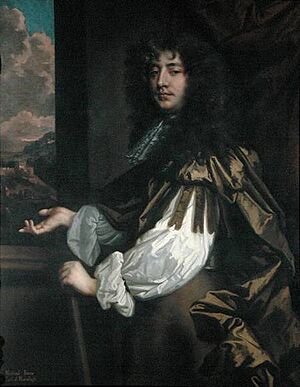Richard Jones, 1st Earl of Ranelagh facts for kids
Richard Jones, 1st Earl of Ranelagh (born February 8, 1641 – died January 5, 1712) was an important figure in Irish and English politics. He was known as The Viscount Ranelagh before he became an Earl. He held positions in both the English and Irish Parliaments.
Contents
Early Life and Family
Richard Jones was the oldest son of Arthur Jones, 2nd Viscount Ranelagh, and Katherine Boyle. His mother, Katherine, was the daughter of the Earl of Cork. Her brothers included Robert Boyle, a famous chemist, and Lord Broghill, who later became the Earl of Orrery. Lord Broghill was a key politician during the time of Oliver Cromwell and after King Charles II returned to the throne. Richard grew up mostly in his mother's home in London.
Working in the Irish Parliament
After King Charles II returned to power, Richard Jones became a member of the Irish Parliament for Roscommon. In 1668, he joined the Privy Council of Ireland, a group of advisors to the King.
At first, Ranelagh was part of a group in the Irish Parliament that disagreed with the way land was being settled by Ormond, who was the King's representative in Ireland. But when Ranelagh was given a government job as Irish Chancellor of the Exchequer (which managed the country's money), he became a strong supporter of Ormond.
In 1671, Ranelagh saw a chance to help Ireland's finances. He suggested that the King could actually make money from Ireland if the government managed its funds differently. Ranelagh and his partners were then given a special "undertaking." This meant they took over the King's debts and managed the Irish treasury. For this, Ranelagh was made an Earl and became the Vice-Treasurer of Ireland. He had a lot of influence on the Irish government from England, working closely with the Earl of Danby, who was King Charles's main minister.
Working in the English Parliament
The "undertaking" ended in 1675, and by then, the King's debts were cleared. Ranelagh made sure that money was regularly sent to the English Treasury. Some of this money helped pay for King Charles's troops, and some was used to fix up Windsor Castle.
Ranelagh was very good at managing money. Even though he sometimes paid the Irish army less than expected, they were actually paid better than they had been under previous, less organized systems. He stopped being involved in Irish affairs in 1681.
Ranelagh stayed close to the Earl of Danby. Even when Danby lost power, Ranelagh remained loyal to King Charles II. He also stayed in favor during the reign of King James II. When William III and Mary II became rulers during the Glorious Revolution, Ranelagh successfully switched his loyalty and became an important person in their new government.
In 1670, he inherited his father's title, Viscount Ranelagh. In 1674, he was given the new title of First Earl of Ranelagh. Since these titles were Irish, they did not stop him from being a member of the English House of Commons. In 1685, he was elected as a Member of Parliament (MP) for Plymouth. In the same year, he got the important job of Paymaster of the Forces, which meant he managed the army's money. He later served as an MP for other areas like Newtown, Chichester, Marlborough, and West Looe. In 1692, he became a member of the English Privy Council.
In 1703, Ranelagh was removed from the House of Commons. This happened because there were problems found in his accounts as Paymaster, and it was discovered that a large amount of public money was unaccounted for.
Later Life and Legacy
Richard Jones was known for enjoying life. He had a wife, Margaret Cecil, and three daughters from his first wife, Elizabeth Willoughby.
He was involved in many building projects. He helped with the construction of Chelsea Hospital and built his own home, Ranelagh House, nearby. Although Ranelagh House no longer exists, its beautiful pleasure gardens were later given to Chelsea Hospital and still carry his name today. His country home was Cranbourne Lodge, located in Windsor Great Park near Windsor. He also founded Ranelagh School in nearby Cranbourne, which has since moved to Bracknell.
Richard Jones died in 1712. He did not have any living sons, so his title of Earl ended. His son, Edward Jones, had died at the age of three in 1678.
Irish Properties
In 1704, Richard, Earl of Ranelagh, owned a lot of land in Ireland. This included properties in County Roscommon, such as the town of Roscommon itself, and also in County Dublin, County Meath, and County Westmeath.
 | Janet Taylor Pickett |
 | Synthia Saint James |
 | Howardena Pindell |
 | Faith Ringgold |


